Grave Encounters
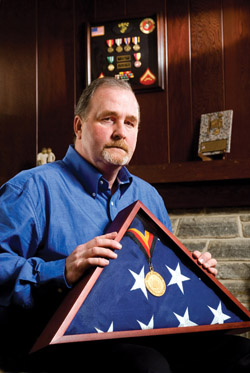
Al Snyder. Photo by David Fonda
Win or lose, picketing preacher Fred Phelps says he’ll get what he wants when the U.S. Supreme Court considers whether the First Amendment protects his tiny flock’s demonstrations outside slain soldiers’ funerals. His Kansas congregation complains that America has reached the brink of destruction by increased tolerance of gays in the military and national life.
Phelps already has provoked outrage for years by toting signs crammed with gay-baiting slurs to services for dead soldiers. He sees the Supreme Court case as the mother lode.
“Can you think of a better way to get free publicity?” asks Phelps, a disbarred lawyer and founder of Westboro Baptist Church in Topeka. “This thing at the Supreme Court is worth millions. We’re on top of the pyramid now.”
But while Phelps says free speech is on his side, Al Snyder says Phelps’ presence near his son’s 2006 funeral disrupted his First Amendment right to freely exercise his religion. His son, Marine Corps Lance Cpl. Matthew A. Snyder, 20, was killed on March 3, 2006, in a vehicle crash while serving in Iraq.
A federal jury in Baltimore found that Phelps intentionally inflicted emotional distress on Snyder. It awarded Snyder $10.9 million, which included $8 million in punitive damages. The trial judge reduced that to $5 million, and the 4th U.S. Circuit Court of Appeals at Richmond, Va., wiped out the entire amount when it reversed the verdict last September.
“The Supreme Court has to do something,” says Snyder, an industrial equipment salesman from York, Pa. “What kind of a society have we become when we can’t even bury our dead?”
Oral arguments are scheduled for Oct. 6 in what could lead to the court’s most significant First Amendment decision in decades. The defendants in Snyder v. Phelps include Westboro Baptist, Phelps and two of his daughters, Shirley L. Phelps-Roper and Rebekah A. Phelps-Davis.
“This is just flat-out targeted speech that attacks a grieving family,” says Snyder’s lawyer, Sean E. Summers, also of York.
Outside observers consider it unlikely that the justices would curb First Amendment protection for hate speech, as they have in other areas, even if they choose to restrict funeral pickets.
Still, the road for Snyder is jam-packed with constitutional landmines. Phelps and free speech advocates worry that a win for Snyder could be used to strip First Amendment protection from a wide array of other important exercises of potentially offensive public speech. Hanging in the balance, but not as an issue before the court, are laws that have been enacted in response to Phelps’ antics by the federal government, 48 states and the District of Columbia.
THE DEAN OF HATE
The case comes as a major monitoring organization reports a 55 percent rise in the number of extremist groups of all stripes since 2000. An annual survey by the Southern Poverty Law Center in Montgomery, Ala., attributes the increase to mistrust of the federal government, the lagging economy, immigration along the Mexican border, and the election of the nation’s first black president. Violence was not a prerequisite for inclusion in the report, released this spring.
“It’s not a matter of criminality or potential for violence,” says report author Mark Potok, who directs the center’s intelligence gathering on hate groups. “It’s ideology.”
The Internet has added an enormous new dimension to the proliferation of hate groups. As recently as the 1980s, folks like Phelps would have been relegated to grinding out caustic letters to the editor. The Internet—which Phelps says God created “just for this little church”—presents a forum that enables hate groups to spread their messages far and wide.
“Hate has gone viral,” says Washington, D.C., lawyer Christopher Wolf, a former local board chair for the Anti-Defamation League and for the International Network Against Cyber-Hate, which unites organizations worldwide against online hate speech. “Today, anyone can be a hater if they want to be.”
If there were a dean of hate group leaders, Phelps likely would be a top candidate. Though he says he merely preaches Old Testament-style “tough love” and hates no one, Phelps doesn’t apologize for his tactics, which depend on slur-laden online diatribes and crudely worded protest signs decrying homosexuality.
He bases his views on a common belief that the Bible prohibits homosexuality and warns that America is doomed for its acceptance of gays. Other evils for Phelps include the Roman Catholic Church and Jews. Even other fundamentalist Christian preachers are too mealy-mouthed for Phelps because they soft-pedal the dangers of gay tolerance.
Sometimes the ill-feeling has been mutual. The late evangelist Jerry Falwell, who once apologized for linking the 9/11 terrorist attacks to homosexuality, called Phelps a “loon.”
Still, few would suggest Phelps does things halfway. He claims to have staged some 3,000 protests against gays, starting long before he began focusing on funerals for soldiers. The Phelpses also have run up a string of arrests, but few convictions, on charges that include contempt of court, assault, battery, trespassing and disorderly conduct. When Phelps tried to take his show to the United Kingdom in 2009, the British Home Office barred him and other family members from entering the country.
Phelps says there’s nothing obsessive about staying on message: That God will destroy America for accepting homosexuals, whom he casually refers to as “fags” in everyday conversation.
“I’ve been preaching this same gospel for 64 years,” he says. “So I don’t want to hear anything from you birds that this isn’t a sincerely held religious belief.”
A ‘PERSONAL VENDETTA’
Fred Waldron Phelps was born Nov. 13, 1929, in Meridian, Miss. Though a dropout at Bob Jones University, he was ordained a Baptist minister at age 17. He got his first taste of notoriety in California in 1952, when Time magazine featured a street ministry he started to rail against dirty jokes and petting.
In 1954, Phelps and his wife, Marge, moved to Topeka; a year later, Phelps founded Westboro Baptist. Today the church has a congregation of about 70 members, nearly all of whom are related to Phelps by blood or marriage. The church accepts no outside donations, and members finance the protests out of their own pockets.
Phelps received a law degree from Washburn University in 1964. His admission to practice hit a snag from the beginning, however, when no judge would give him a character reference, as required by Kansas law. Phelps eventually was able to provide other references, and six of his 13 children have followed in his footsteps to become lawyers. Daughter Margie J. Phelps will argue the case before the Supreme Court.
In his early years, Phelps won recognition in Topeka for filing civil rights suits to enforce Brown v. Board of Education on behalf of black clients. But professional misconduct in dealing with clients and adversaries ultimately unraveled Phelps’ law career.
In 1969, Phelps was suspended for two years on three counts of misconduct, including a charge that he misapplied $200 taken from a woman to pay for her ex-husband’s bail on a criminal charge. Although he was a court-appointed attorney for the husband, he instead applied the cash toward his fee for representing the woman in her divorce against his client.
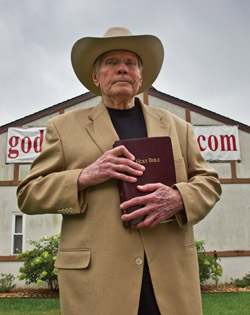
Pastor Fred Phelps. Photo by Nick Vedros
Phelps was finally disbarred in 1979 for his behavior during a $2 million lawsuit filed against Carolene Brady, a court reporter who had been late with a transcript for a Phelps client charged with a felony. Although the client was acquitted, Phelps pursued the lawsuit. He called Brady as a witness, declared her hostile and kept her on the stand four days. The state supreme court called the ensuing cross-examination “abusive, repetitive, irrelevant and … a classic case of ‘badgering’ a witness.”
In State v. Phelps, the court declared the suit a “personal vendetta” and pulled his ticket for good, noting that Phelps had “the temerity to complain that Brady cried in the presence of the jury.”
Discipline didn’t slow Phelps down. After the state disbarred him, Phelps continued to practice in federal court. He filed suits against Washburn University after three of his children were denied admission; filed a $50 million class action against Sears because a local store was a few days late delivering a television set; and sued President Ronald Reagan in 1984 for sending an ambassador to the Vatican, claiming the appointment violated religious freedom under the First Amendment.
In 1985, federal judges in Kansas found themselves the target of Phelps’ invective. They lodged a disciplinary complaint against him and his family. Phelps settled the case in 1989 by agreeing to stop practicing in federal court so his family members could continue to represent clients there.
As part of the deal, daughter Margie Phelps was suspended for a year, and son Fred Phelps Jr. received a six-month suspension.
Margie Phelps says the family merely complained about the judges adding unnecessary extra security whenever her father brought large numbers of black clients into court during class action proceedings. “It was that sort of stuff,” she says. “So we questioned that practice.”
After the law, politics beckoned. Three times in the 1990s, Phelps sought the Democratic nomination for Kansas governor; once he tried for the U.S. Senate. Though he got clobbered every time, Phelps still says he achieved his real goal: publicity.
At the time, Phelps was beginning his protests against gays, first in Topeka, then nationwide. In 1998, his clan gained national notoriety when they picketed the funeral of Matthew Shepard—a gay college student tortured and murdered near Laramie, Wyo.—with signs declaring “Matthew Shepard Rots in Hell” and “God Hates Fags.”
But once the wars in Iraq and Afghanistan began, Phelps decided to make the military a centerpiece of his anti-gay message because of its policy of “Don’t ask, don’t tell.”
Though gay rights advocates assail the military policy as discriminatory, Phelps sees it as encouraging homosexuality. So Phelps decided to portray the deaths of Americans in Iraq and Afghanistan as evidence of divine wrath for having embraced any form of gay tolerance.
“With that message,” Phelps says, “the forum of choice would be a funeral.”
Phelps presents his funeral crusade as a perverse, but logical, campaign for publicity. But during his testimony at the Snyder trial, Phelps described an incident that suggests he harbors a deeper grudge against the military.
At one of his early public protests, Phelps says, he and his group were confronted by a counterprotest that included young men in uniform who taunted and attacked them.
“The last straw was when a group of about 12 Marines in uniform assaulted one of our humble picket spots where we were peacefully picketing, and molested our people and simulated … anal sex and felt that was great stuff,” Phelps testified.
Margie Phelps says the group was actually made up of high school ROTC students. But the distinction has remained lost on Phelps; and since then small detachments of Phelps’ followers have picketed countless military funerals, careful not to violate any laws except, perhaps, those of good taste.
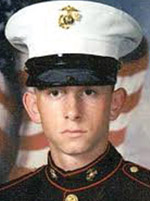
Marine Corps Lance Cpl. Matthew Snyder was killed in 2006 while serving in Iraq.
DRESS BLUES AT THE DOOR
Al Snyder was stunned when he learned that Fred Phelps planned to travel halfway across the country to picket his son’s funeral, scheduled for March 10, 2006, in Westminster, Md., where Matthew grew up and went to high school. Matthew wasn’t gay, and Phelps never had met him or his family.
“I think it’s a crime,” says Snyder. “It’s the same as terrorism. They terrorize innocent people at the time when they’re most vulnerable.”
Snyder had received the news a few nights before when two Marines in dress blues came to his door. “When I flipped on the light and saw the Marines, I knew what it was.” He kept hoping the Marines had made a mistake until he saw his son’s body for himself. So Snyder and his family set about making arrangements for the funeral, to be held with full military honors at St. John’s Catholic Church, Matthew’s home parish.
Three years earlier as a high school senior, Matthew had told his father he wanted to enlist in the Marine Corps. Because he was only 17 at the time, Snyder had to give his permission for Matthew to enlist, though he turned 18 by the time he reported to boot camp in October 2003. He went to Iraq as a generator mechanic with Combat Logistics Battalion 7, out of Twentynine Palms, Calif.
“Matt wanted to go into the military ever since he was 9 or 10,” Snyder recalls. “It was a dream of his.” Still, Snyder was no pushover when it came to giving his blessing. “I made Matt really think about it for a week or two before I signed the papers.”
Matthew was the middle child between two sisters—Sarah, the oldest, and Tracie. He was quick with a joke, so quick his dad suggests he may have missed his true passion. “I always tell people if Matt hadn’t been a Marine, he would have been a stand-up comedian.”
Though he received mostly A’s and B’s in school, getting them posed a challenge. “It didn’t come easy for Matt,” his dad remembers. “He had to study for them.”
Matthew had several girlfriends growing up, but his father says he never got serious because he already knew he was headed for the sometimes lonely and dangerous life of a soldier. An avid baseball and soccer player, Matthew’s assignment to Iraq had to wait a while after he broke his leg in three places playing soccer while he was stationed at Camp Lejeune, N.C.
Matthew shipped out for Iraq in January 2006. He called or wrote home when he had the chance. “He mainly said, ‘Hey. I’m here, I’m fine and don’t worry,’ ” Snyder says.
The last letter contained more of the same, but it arrived two days after the Marines delivered the devastating news. “That was probably the hardest letter I ever read,” Snyder says.
Meanwhile, the Phelpses, who had learned of Matthew’s funeral on the Internet, were preparing for their trip to Maryland. Following their usual practice, they gave local police a heads-up and checked city ordinances to ensure they wouldn’t run afoul of restrictions on the time, place or manner of their demonstration.
A band of seven protesters arrived in Westminster with an array of posters sporting such slogans as “Thank God for Dead Soldiers,” and “Semper Fi Fags.”
Police initially allowed the protesters to use a public sidewalk about 30 feet from the church’s main entrance. But officers intercepted the limousine carrying Snyder and his daughters and rerouted it to a rear entrance, out of sight of the protesters, who later moved behind a small hill.
One of the three questions the court asked is whether funeral-goers constituted a “captive audience” who couldn’t escape Phelps’ message and therefore deserve government protection.
Snyder acknowledges that he never saw more than perhaps the tops of some signs. Though that hasn’t appeared to bother the two courts that so far have examined the case, the defendants have tried to make much hay out of it in their briefs. How, they ask, could they have interfered with the funeral if Snyder couldn’t even see them?
“What did they want me to do?” Snyder wonders. “Leave my son’s body behind in his last hours on earth to go and read their obscene signs?”
Snyder’s blood started to boil even faster when he turned on the television news after the service and saw the coverage Phelps received. Phelps still wasn’t done after the protest. In the weeks after the funeral, Westboro Baptist posted on its website an “epic,” titled “The Burden of Marine Lance Cpl. Matthew Snyder,” claiming Matthew was “raised for the devil” and “taught to defy God.”
Snyder says his diabetes spun out of control and physicians diagnosed him as clinically depressed, conditions he later cited as evidence that Phelps had indeed caused him severe emotional distress. Still, he knew early on that his case would be a tough one and initially balked at suing.
“As a matter of fact, my attorneys almost talked me out of it,” he says, “more than a couple of times.”
By early June 2006, however, Snyder went to court. In addition to his claim for emotional distress, Snyder also accused the defendants of defamation, two variations on invasion of privacy and civil conspiracy. The trial judge dismissed the defamation count and one of the privacy claims, but the 4th Circuit tossed the entire verdict on First Amendment grounds, leaving Snyder with an order to pay Phelps’ legal bills of $16,510.
Snyder says one reason he sued Phelps was to spare other soldiers’ families from enduring similar ordeals. The case before the Supreme Court has grown much larger than he anticipated.
A bipartisan group of 42 U.S. senators headed by Democratic Majority Leader Harry Reid and Republican Minority Leader Mitch McConnell filed an amicus brief supporting Snyder and defending federal restrictions on funeral protests. Attorneys general from the states that have passed similar restrictions filed a brief defending their laws. Veterans groups also have joined Snyder’s side.
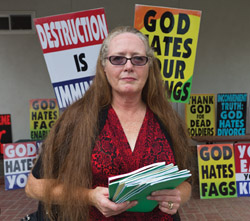
Daughter Margie Phelps will argue the church’s case before the Supreme Court. Photo by Nick Vedros
HOLDING THEIR NOSES
Phelps has attracted support too, not only from conservative religious organizations but also from civil libertarians and media organizations who’ve held their noses to express fear that a ruling against Phelps would diminish the right of free speech for everyone.
“This case tests the mettle of even the most ardent free speech advocates because the underlying speech is so repugnant,” the Reporters Committee for Freedom of the Press stated in an amicus brief filed for most of the nation’s largest news organizations and related professional associations.
The Phelpses predict the court will unanimously hold for them. And to win, Snyder must overcome several serious constitutional hurdles.
First is the court’s seminal 1988 decision against Phelps’ old nemesis Falwell, who claimed a parody in the adult magazine Hustler caused him severe emotional distress.
The court held that as a public figure, Falwell couldn’t recover for emotional distress without showing falsity and actual malice—a “reckless disregard for the truth.” And the justices now want to know whether the same standard should be extended to a First Amendment conflict between private parties.
The Phelpses argue that Snyder is not a protected private party. By granting interviews to reporters, he made himself a public figure; and by publishing a death notice in newspapers with the time, date and place for the funeral, he made the service a public event.
Further contributing to the public atmosphere, the Phelpses say, were the hordes of reporters and police gathered outside the church, as well as the Patriot Guard Riders, a group of motorcyclists formed to erect an ad hoc buffer between mourners and the Phelpses.
Moreover, Phelps says that questions of truth and falsehood don’t matter; the Constitution protects opinions, even those that don’t contain provable facts.
The court may demand sincerity of religious belief to afford constitutional protection, but it doesn’t require those beliefs to be rational. So Phelps boasts that his church already enjoys the best of both worlds.
“We’ve got freedom of speech, and we’ve got freedom of religion,” he says.
But in framing the question as a private matter between two private people, the court may be signaling a willingness to afford Snyder more leeway than Falwell, which could allow a reinstatement of the judgment against Phelps.
“If I’m a public figure now, it’s because they made me one,” Snyder says.
That said, the court’s next question is even tougher: Does Phelps’ free speech outweigh Snyder’s free exercise of religion?
Phelps says the issue is ridiculous. And while courts have cited a state’s interest in protecting citizens against the kinds of injuries Snyder says Phelps inflicted on him, Snyder’s lawyer, Summers, cites no Supreme Court case that pits free speech and religious exercise directly against one another. He does, however, cite some of the high court’s privacy decisions that curtail speech “dependent upon a showing that substantial privacy interests are being invaded in an essentially intolerable manner.”
“The case for protecting an individual’s rights to exercise his religion and to peacefully assemble at a funeral service is even stronger,” Summers argues in his petitioner’s brief. “Indeed, the founders chose to place these rights on an equal footing with the right to free speech by listing all three protections in the First Amendment.”
Phelps refuses to engage in a balancing test and argues that the court should decline to do so, too. Such a test “poses false alternatives” in a situation where the rights of both sides already received full protection.
In criminal cases, law enforcement avoids First Amendment problems by filing charges that target conduct, not speech. And though defendants cannot be charged simply for what they say, their words still can provide valuable evidence of motive and intent.
Civil court is another matter. Indeed, suing haters is a difficult prospect at best, especially since the Supreme Court affords the highest degree of protection to the kind of political speech they engage in.
But it can be done.
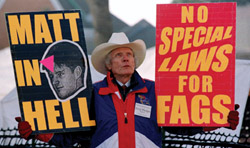
Phelps speaks out after the beating murder of gay student Matthew Shepard. Photo by Associated Press
The Anti-Defamation League, for example, won a trademark action against an anti-Semite who hijacked the organization’s logo and used it to lure unsuspecting Web surfers to his site. And in a case involving harassment of a fair housing specialist by white supremacists, the Southern Poverty Law Center went the administrative law route at the Department of Housing and Urban Development. The SPLC won a $1 million judgment against a neo-Nazi leader and extracted 1,000 hours of community service and other punishment in a settlement with a Klan leader.
“We have put many, many hate groups out of business without abridging anyone’s First Amendment rights,” says Richard Cohen, president of the SPLC.
Nevertheless, many defendants are penniless to start with, so any sizable monetary award probably is uncollectible—though potential employers, lenders and others likely will flinch at an unsatisfied judgment on a credit report.
Indeed, if the $5 million judgment against the Phelps defendants were re-instated, it could bankrupt them; they listed their net worth in trial court documents at just under $1 million, most of which is tied up in real estate including the church property and personal residences. The prospect of going broke doesn’t appear to bother the family.
“We are going to stand on the streets of this nation, even if we are penniless,” says lawyer Margie Phelps. That’s beside the point, says her father, because God won’t let up—even if the court does.
“These guys are messing with dynamite, whether they know it or not,” Fred Phelps says. “If you’ve got God mad at you, your sons are going to keep on dying.”
Al Snyder says he just wants Phelps to shut up and leave everyone alone.
“I just want it to end now,” he says. “I’ve had enough. I’m tired.”



